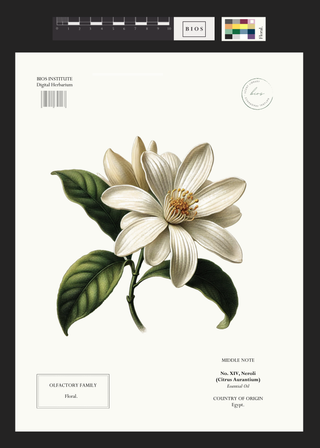

Neroli, also known as orange blossom, is an essential oil derived from the flowers of the bitter orange tree (Citrus aurantium) which is believed to be native to Southeast Asia, particularly in regions that include northeastern India and southern China. From its native range, it was spread to other parts of the world through trade and exploration.
Bitter orange is now widely cultivated in many tropical and subtropical regions, including countries in the Mediterranean, North Africa, the Middle East, the Americas, and other parts of Asia. It has been introduced to various regions for its fruit, which is used in culinary applications and the production of marmalades and liqueurs. Our neroli is sourced from Egypt.
Neroli oil has a sweet, floral, and citrusy aroma with honeyed and slightly spicy undertones. It is often described as delicate, fresh, and uplifting. The scent is reminiscent of orange blossoms in full bloom, evoking feelings of joy, sensuality, and elegance.
Neroli is a prized ingredient in many perfumes, contributing to various fragrance families such as floral, citrus, and oriental. It blends well with other floral notes like rose and jasmine, as well as citrus notes like bergamot and petitgrain. Its versatility allows perfumers to use it in a wide range of compositions, from fresh and light colognes to rich and complex oriental fragrances. It is a Middle note found in our Floral family.
Neroli is commonly used in perfumes for both men and women. It is often found in classic perfumes, as well as contemporary creations. Its uplifting and refreshing qualities make it suitable for daytime and warmer weather fragrances, but it can also be used as a beautiful accent in evening and cooler weather perfumes.
Overall, neroli is highly regarded in the world of perfumery for its delightful scent and versatility. Its presence in a fragrance adds a touch of elegance, freshness, and sophistication. Whether used as a prominent note or as a supporting ingredient, neroli contributes to the overall beauty and complexity of perfumes.
In Catholicism, neroli, or orange blossom, is associated with the Virgin Mary and is often used symbolically in religious rites and ceremonies. Here are some aspects of neroli's connection to Catholicism:
Neroli is considered a symbol of purity and innocence, qualities often attributed to the Virgin Mary. The delicate white blossoms are seen as representations of Mary's pure and immaculate nature.
Floral Offerings: Neroli flowers or their essence may be offered as a sign of devotion and reverence to the Virgin Mary. They are sometimes used as floral decorations in churches, especially during Marian feasts or celebrations, such as the Feast of the Assumption or the Feast of the Immaculate Conception.
Wedding Ceremonies: In some Catholic wedding ceremonies, neroli flowers are incorporated into bridal bouquets, floral arrangements, or worn as corsages. The use of neroli is believed to invoke the blessings and intercession of the Virgin Mary on the newlywed couple, emphasizing the qualities of purity and grace associated with her.
During processions or religious festivals dedicated to the Virgin Mary, the scent of neroli may be diffused or used in the form of incense. The fragrance creates a sacred and uplifting atmosphere, enhancing the spiritual experience of the faithful and serving as a symbolic connection to the divine.
Neroli
- Unit price
- /per
Please note this product format is a small vial that contains roughly 20 drops of scent concentrate. This can be purchased à la carte but is intended to be used with our Perfume Kit.
SCENT SPECIFICATIONS
Latin Name: Citrus Aurantium
Extraction Method: Steam Distilled
Country of Origin: Egypt
All of the scents in our library our naturally derived - our collection includes essential oils, absolutes, concretes, isolates, enfleurage, macerations, oleoresins, and mixed medium naturals.
Adding product to your cart
Neroli, also known as orange blossom, is an essential oil derived from the flowers of the bitter orange tree (Citrus aurantium) which is believed to be native to Southeast Asia, particularly in regions that include northeastern India and southern China. From its native range, it was spread to other parts of the world through trade and exploration.
Bitter orange is now widely cultivated in many tropical and subtropical regions, including countries in the Mediterranean, North Africa, the Middle East, the Americas, and other parts of Asia. It has been introduced to various regions for its fruit, which is used in culinary applications and the production of marmalades and liqueurs. Our neroli is sourced from Egypt.
Neroli oil has a sweet, floral, and citrusy aroma with honeyed and slightly spicy undertones. It is often described as delicate, fresh, and uplifting. The scent is reminiscent of orange blossoms in full bloom, evoking feelings of joy, sensuality, and elegance.
Neroli is a prized ingredient in many perfumes, contributing to various fragrance families such as floral, citrus, and oriental. It blends well with other floral notes like rose and jasmine, as well as citrus notes like bergamot and petitgrain. Its versatility allows perfumers to use it in a wide range of compositions, from fresh and light colognes to rich and complex oriental fragrances. It is a Middle note found in our Floral family.
Neroli is commonly used in perfumes for both men and women. It is often found in classic perfumes, as well as contemporary creations. Its uplifting and refreshing qualities make it suitable for daytime and warmer weather fragrances, but it can also be used as a beautiful accent in evening and cooler weather perfumes.
Overall, neroli is highly regarded in the world of perfumery for its delightful scent and versatility. Its presence in a fragrance adds a touch of elegance, freshness, and sophistication. Whether used as a prominent note or as a supporting ingredient, neroli contributes to the overall beauty and complexity of perfumes.
In Catholicism, neroli, or orange blossom, is associated with the Virgin Mary and is often used symbolically in religious rites and ceremonies. Here are some aspects of neroli's connection to Catholicism:
Neroli is considered a symbol of purity and innocence, qualities often attributed to the Virgin Mary. The delicate white blossoms are seen as representations of Mary's pure and immaculate nature.
Floral Offerings: Neroli flowers or their essence may be offered as a sign of devotion and reverence to the Virgin Mary. They are sometimes used as floral decorations in churches, especially during Marian feasts or celebrations, such as the Feast of the Assumption or the Feast of the Immaculate Conception.
Wedding Ceremonies: In some Catholic wedding ceremonies, neroli flowers are incorporated into bridal bouquets, floral arrangements, or worn as corsages. The use of neroli is believed to invoke the blessings and intercession of the Virgin Mary on the newlywed couple, emphasizing the qualities of purity and grace associated with her.
During processions or religious festivals dedicated to the Virgin Mary, the scent of neroli may be diffused or used in the form of incense. The fragrance creates a sacred and uplifting atmosphere, enhancing the spiritual experience of the faithful and serving as a symbolic connection to the divine.
